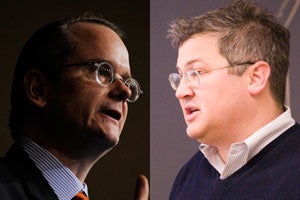HLS Professors Jack Goldsmith and Lawrence Lessig co-wrote the following op-ed that appeared in the March 26 edition of the Washington Post. Goldsmith is co-author of “Who Controls the Internet?” Lessig is the author of “Remix: Making Art and Commerce Thrive in the Hybrid Economy.”
Anti-counterfeiting agreement raises constitutional concerns
by Jack Goldsmith and Lawrence Lessig
The much-criticized cloak of secrecy that has surrounded the Obama administration’s negotiation of the multilateral Anti-Counterfeiting Trade Agreement was broken Wednesday. The leaked draft of ACTA belies the U.S. trade representative’s assertions that the agreement would not alter U.S. intellectual property law. And it raises the stakes on the constitutionally dubious method by which the administration proposes to make the agreement binding on the United States.
The goal of the trade pact is to tighten enforcement of global intellectual property rules. The leaked draft, though incomplete in many respects, makes clear that negotiators are considering ideas and principles not reflected in U.S. law.
ACTA could, for example, pressure Internet service providers — such as Comcast and Verizon — to kick users offline when they (or their children) have been accused of repeated copyright infringement because of content uploaded to sites such as YouTube. It also might oblige the United States to impose criminal liability on those who “incite” copyright violation. The draft more generally addresses “IP infringement” and thus could extend some of its rules to trademark and possibly patent law in ways that, after inevitable international compromises, will depart from U.S. law. It also contemplates creating an international “oversight council” to supervise (and possibly amend) aspects of the agreement.
These proposals might or might not make sense. But they ought at least be subject to public deliberation. Normal constitutional procedures would require the administration to submit the final text of the agreement for Senate approval as a treaty or to Congress as a “congressional-executive” agreement. But the Obama administration has suggested it will adopt the pact as a “sole executive agreement” that requires only the president’s approval.
Such an assertion of unilateral executive power is usually reserved for insignificant matters. It has sometimes been employed in more important contexts, such as when Jimmy Carter ended the Iran hostage crisis and when Franklin Roosevelt recognized and settled expropriation claims with the Soviet Union.
The Supreme Court, however, has never clarified the limits on such agreements. Historical practice and constitutional structure suggest that they must be based on one of the president’s express constitutional powers (such as the power to recognize foreign governments) or at least have a long historical pedigree (such as the president’s claims settlement power, which dates back over a century).
Joining ACTA by sole executive agreement would far exceed these precedents. The president has no independent constitutional authority over intellectual property or communications policy, and there is no long historical practice of making sole executive agreements in this area. To the contrary, the Constitution gives primary authority over these matters to Congress, which is charged with making laws that regulate foreign commerce and intellectual property.
The administration has suggested that a sole executive agreement in this instance would not trample Congress’s prerogatives because the pact would not affect U.S. domestic law. Binding the United States to international obligations of this sort without congressional approval would raise serious constitutional questions even if domestic law were not affected. In any event, an anti-counterfeiting agreement made on the president’s own authority could affect domestic law in at least three ways:
First, the noncriminal portions of this agreement that contemplate judicial enforcement can override inconsistent state law and possibly federal law. Second, the agreement could invalidate state law that conflicts with its general policies under a doctrine known as obstacle preemption, even if the terms are not otherwise judicially enforceable. Third, a judicial canon requires courts to interpret ambiguous federal laws to avoid violations of international obligations. This means courts will construe the many ambiguities in federal laws on intellectual property, telecom policy and related areas to conform to the agreement.
If the president proceeds unilaterally here, ACTA will be challenged in court. But the best route to constitutional fidelity is for Congress or the Senate to protect its constitutional prerogatives. When the George W. Bush administration suggested it might reach a deal with Russia on nuclear arms reduction by sole executive agreement, then-Sen. Joe Biden wrote to Secretary of State Colin Powell insisting that the Constitution required Senate consent and implicitly threatening inter-branch retaliation if it was not given. The Bush administration complied.
Congress should follow Biden’s lead. If the president succeeds in expanding his power of sole executive agreement here, he will have established a precedent to bypass Congress on other international matters related to trade, intellectual property and communications policy.
These mostly secret negotiations have already violated the Obama administration’s pledge for greater transparency. Embracing this deal by sole executive agreement would repudiate its pledge to moderate assertions of executive power. Congress should resist this attempt to evade the checks established by our Framers.
